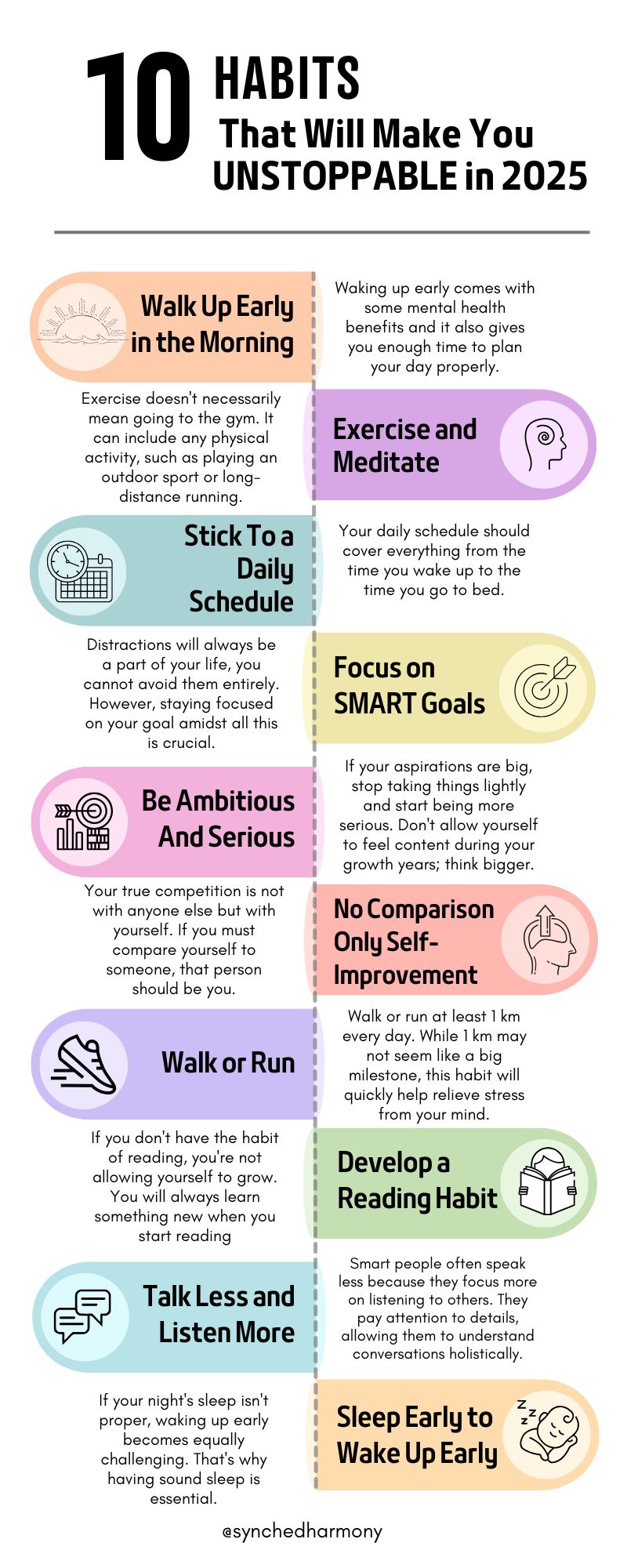If you want to be successful in 2025, merely talking about it won’t be enough; you’ll need to change some habits to improve yourself truly. No matter how realistic the goals you set for the start of the New Year in 2025 may be, you will never fully achieve them unless you work on changing your habits.
I’m not saying that your current habits are bad and need fixing. Instead, my point is that if you incorporate the habits we discuss in this article into your daily routine, nothing can stop you from achieving your goals in 2025. Let’s explore through this article the 7 habits that will make you unstoppable in 2025.

10 Habits That Will Make You UNSTOPPABLE in 2025
Walk Up Early in the Morning
If you want to make your day meaningful, start it right—wake up early. Now the question arises, how early is early? Some might say wake up at 5:00 AM, others may suggest 5:30 AM, and for some, even 10:00 AM feels early. However, ideally, if you wake up before 7:00 AM, you’ll have plenty of time to make your day productive.
Quick Tip:
- Start by setting an alarm 15 minutes early each week before your desired time.
- Avoid using mobile phone alarms to reduce screen exposure time.
Waking up early comes with some mental health benefits and it also gives you enough time to plan your day properly. A study published in JAMA Psychiatry found that waking up just one hour earlier can reduce the risk of major depression by 23%. This suggests a significant link between earlier wake times and improved mental health.
Exercise and Meditate
Exercise doesn’t necessarily mean going to the gym. It can include any physical activity, such as playing an outdoor sport or long-distance running. The goal is to engage in a workout that makes you sweat, using your body weight to move and strengthen your arms and legs. A workout should genuinely challenge your muscles and ensure proper physical exertion. A 30 to 45-minute exercise session followed by 15 to 20 minutes of meditation should become a non-negotiable part of your daily routine.
Quick Tip:
- Start with light-weight exercises for a week or two.
- Walking or Running at least 1 km daily keeps depression away.
- Try to meditate in an environment where the surroundings are calm and noise-free.
A study on The effect of daily walking exercise on sleep quality in healthy young adults published on ResearchGate shows that regular exercise leads to improved sleep quality and enhances overall well-being. Similarly, a paper published in PubMed Central on Meditation and Its Mental and Physical Health Benefits in 2023 said that mindfulness meditation can reduce daytime disturbances. Meditation calms your mind, removes unnecessary thoughts, and helps you focus your attention in one place. There’s nothing better than this to prepare yourself mentally before starting any productive task.

Stick To a Daily Schedule
No matter how well or energetically you start your day, you will never meet your goals and tasks if you are not organized properly. Having a daily schedule is essential—not just for office or study hours, but for the entire day. As per the paper published by Jun Kohyama on Good daily habits during the early stages of life determine success throughout life, maintaining a consistent daily routine can enhance productivity and reduce stress.
Quick Tip:
- Use a journal or daily planner.
- Add buffer time for relaxation and refreshment.
- Prepare weekday and weekend schedules separately.
Your daily schedule should cover everything from the time you wake up to the time you go to bed. Make sure it incorporates proper time management, with sufficient time allocated to each activity and buffer periods for relaxation. Along with this, don’t forget to include personal and family time so that you can spend the necessary moments with yourself and your loved ones.
Focus on SMART Goals
Distractions will always be a part of your life, you cannot avoid them entirely. However, staying focused on your goal amidst all this is crucial. Your focus will remain intact only when you clearly know what your end goal is and what you want to achieve.
Quick Tip:
- Try to be specific about each goal.
- Make sure goals are achievable and measurable.
To build this level of focus, having SMART goals is essential. But what is the difference between a regular goal and a SMART goal, and how can you transform your goals into SMART ones? The article below will help you understand this concept in detail and guide you in setting effective SMART goals for yourself.
Must Read: 10 SMART Goals For Success in 2025
Be Ambitious And Serious
Be ambitious in life. If your aspirations are big, stop taking things lightly and start being more serious. Don’t allow yourself to feel content during your growth years; think bigger. Analyze situations and learn lessons from them. Develop the habit of paying attention to detail. Understand things thoroughly, and don’t hesitate to question until you fully comprehend. When you start digging deeper into matters and show interest, things will begin to make more sense. Take genuine interest in what you’re planning to do, and treat every aspect related to it with seriousness.
Quick Tip:
- Create a vision for your life.
- Take a genuine interest in things.
- Question everything until it is not clear.
No Comparison Only Self-Improvement
One thing you need to understand is that your true competition is not with anyone else but with yourself. If you must compare yourself to someone, that person should be you. Often, in the process of comparing ourselves to others, we fall into the trap of jealousy. This shifts our focus from self towards what someone else is doing. Such comparisons not only become a distraction but also deeply hurt our self-esteem, making it very challenging to regain confidence and stay on track.
Instead, your focus should always be on personal development because that will help you be a better version of yourself rather than striving to become better than anyone else. Everybody is on a different journey, so stay focused on yourself.
Quick Tip:
- Focus on your own growth and achievements.
- Take incremental steps towards growth day by day.
Walk or Run At Least a Kilometer Daily
Make it a habit to walk or run at least 1 km every day. While 1 km may not seem like a big milestone, trust me, this habit will quickly help relieve stress from your mind. Walk whenever you want to relax, and if you join someone, the walk becomes even more stress-free. I would recommend starting this habit after your day is over or after dinner. Trust me, this will not only help relax your mind but also improve your sleep quality.
A systematic review and network meta-analysis published in The BMJ analyzed 218 randomized controlled trials involving over 14,000 participants. The study found that various forms of exercise, including walking, jogging, yoga, and strength training, were associated with reductions in depressive symptoms.
Quick Tip:
- Start slowly and include checkpoints.
- Don’t over-exert yourself.
- Push for the limit and hit the finish line.
Furthermore, a study published in JAMA Network Open analyzed data from 33 prior studies encompassing 96,173 adults. The research found that individuals who walked over 5,000 steps daily generally experienced fewer depressive symptoms compared to those with fewer steps. Walking 7,000 or more steps daily was linked to a lower long-term risk of depression.
Develop a Reading Habit
If you don’t have the habit of reading, you’re not allowing yourself to grow. No matter how good you are in academics or studies, you will always learn something new when you start reading books. However, it’s essential to choose your books wisely. Some books enhance your productivity, while others are merely for passing the time. To ensure optimal use of your reading time, focus on books that add value to your knowledge and help you grow.

A study conducted at Sam Houston State University on the impact of Pleasure Reading on Academic Success highlighted that students who engage in pleasure reading exhibit advantages in vocabulary and mathematics, indicating that reading for enjoyment contributes to academic success. Students who read more frequently and for longer periods achieved better academic scores(ScholarWorks).
Quick Tip:
- Read at least 10-15 pages daily.
- Complete one book before moving to the next one.
- Prepare a summary at the end for quick reference.
Talk Less and Listen More
A study from the University of Minnesota found that active listening is associated with higher conversational satisfaction and perceived understanding, enhancing the social attractiveness of the listener. Smart people often speak less because they focus more on listening to others. They pay attention to details, allowing them to understand conversations holistically before expressing their thoughts. This habit sets them apart from the crowd.
In contrast, many of us tend to overlook what others want to say and sometimes end up speaking more than necessary. This can inadvertently cause more harm than good. Practicing active listening not only helps in understanding others better but also ensures that when you speak, your words carry weight and value.
Quick Tip:
- Pay attention to others’ views.
- Grasp the situation completely before speaking.
- Get a holistic view of the conversation.
Sleep Early to Wake Up Early
To start your day right, going to bed on time is just as important as waking up early. A study published in JAMA Psychiatry by Harvard Health Publishing found that individuals who wake up an hour earlier than usual, without reducing sleep duration, may lower their risk of major depression by 23%.
If your night’s sleep isn’t proper, waking up early becomes equally challenging. That’s why having sound sleep is essential. I’ve noticed that if we cut down screen time at least an hour before bed and replace it with a short walk, it significantly improves sleep quality. This practice helps clear your mind, reducing unnecessary thoughts that could otherwise interfere with your sleep.
Quick Tip:
- Sleep by 11 PM.
- Avoid using mobile phones at least 1 hour before sleep.
- Reading habit before sleeping is good.
How Long Does It Take To Form a Habit?
Forming a new habit can vary from individual to individual and majorly depends on their behavior pattern. A study by Dr. Phillippa Lally and colleagues at University College London found that, on average, it takes about 66 days for a new behavior to become automatic, with individual times ranging from 18 to 254 days.
This study suggests that some habits may form in a matter of a few weeks while some can take several months depending upon the complexity and behavior. Here is my take on what my personal says on habit formation:
- To build any habit, having a strong reason behind it is essential. Whether it’s about losing weight or progressing in your career, the purpose must hold significant meaning for you.
- Another important point is that if you focus solely on the end result you want to achieve while forming a habit, there’s a high chance you might give up quickly. That’s why it’s crucial to develop the habit of setting and achieving small, manageable targets along the way. These smaller milestones keep you motivated and provide a sense of progress, ultimately making it easier to stay consistent and reach your end goal.
- The third important point is that you need to integrate the habit into your daily routine and make it a part of your everyday life. This practice should continue consistently until you achieve your end goal. Often, after reaching small targets, we become so excited and content that we lose focus on the bigger objectives.
- The right way to build any habit is to allocate a specific time for it in your daily schedule and practice it consistently at that time every day. This regularity helps the habit become a natural part of your routine over time.
- If you consistently follow a habit for three weeks without missing a single day, it starts to feel like your “new normal” by the fourth week. Missing that habit even once after this point can make your daily routine feel incomplete, as the habit has become an integral part of your life.
- But this is exactly the milestone where many people start to feel that the habit is now firmly established, and they begin to loosen their discipline. They may stop maintaining their daily routine consistently or occasionally skip the activity, thinking it won’t matter.
- At this point, it’s crucial to stay even more dedicated because maintaining the momentum for the next 2–3 months is essential to solidify the habit. If you can integrate the habit into your daily routine consistently during this period, the chances of it becoming a long-term habit are significantly higher.
Real-Life Experience
These observations I personally noticed when I started my journey of becoming a marathon runner in 2024. Trust me, it was very difficult to complete the first mile itself during the initial month or two but with consistency and embedding running in my daily routine, I managed to make it my daily habit. Today I am a proud finisher of 2 half marathons and several 10 km runs. I also managed to lose 6 kgs of excess fat in the last 12 months.
How long does it take to break a habit?
When it comes to breaking a habit, it’s important to understand how deeply ingrained it has become in your life. If the habit has turned into an addiction, it may require considerable time and even help from a specialist to overcome.
However, if we’re talking about breaking a normal habit, the process is quite similar to forming one, as described earlier. The only difference is that here, the objective is not to form a habit but to break it. This requires a conscious effort to avoid triggers, replace the habit with a positive alternative, and remain consistent in resisting the urge to revert to the old behavior.
Conclusion
To conclude, having the right habits is essential for success in life, and sometimes, to move forward, it’s necessary to change or let go of certain habits at the right time. In this article, we explored 10 key habits that can help you achieve success in 2025. Through my personal experience, we also discussed how long it takes to form or break a habit effectively.
I hope you found this article helpful. Please share it with those who need this motivation the most. Join our community by subscribing to Synched Harmony, where we frequently post similar inspirational and motivational content. Together, let’s work towards a brighter, more successful future!

Greetings! I am the voice behind the thoughts presented on Synched Harmony. As an ordinary individual, I strive to live a life dedicated to achieving inner peace and serenity by cultivating harmony within and making difficult aspects of life work together in sync during tough phases of life. Life becomes much easier if we open ourselves to small changes and respect each other’s personal boundaries, creating space for shared happiness.

3 thoughts on “10 Habits That Will Make You UNSTOPPABLE in 2025”